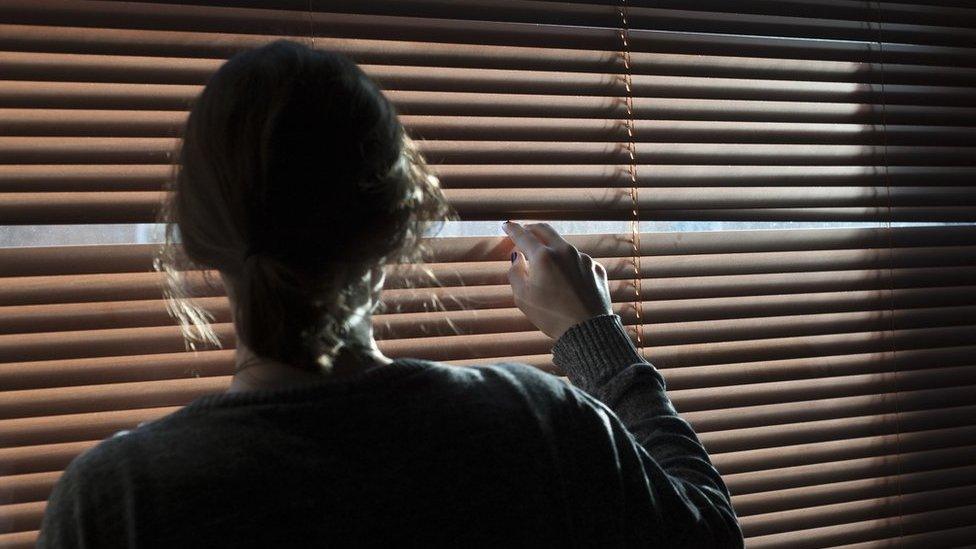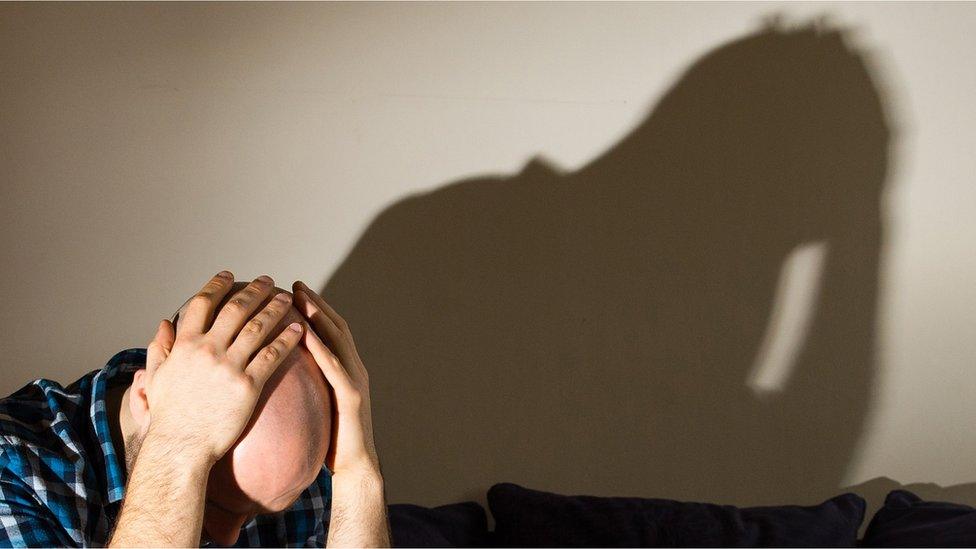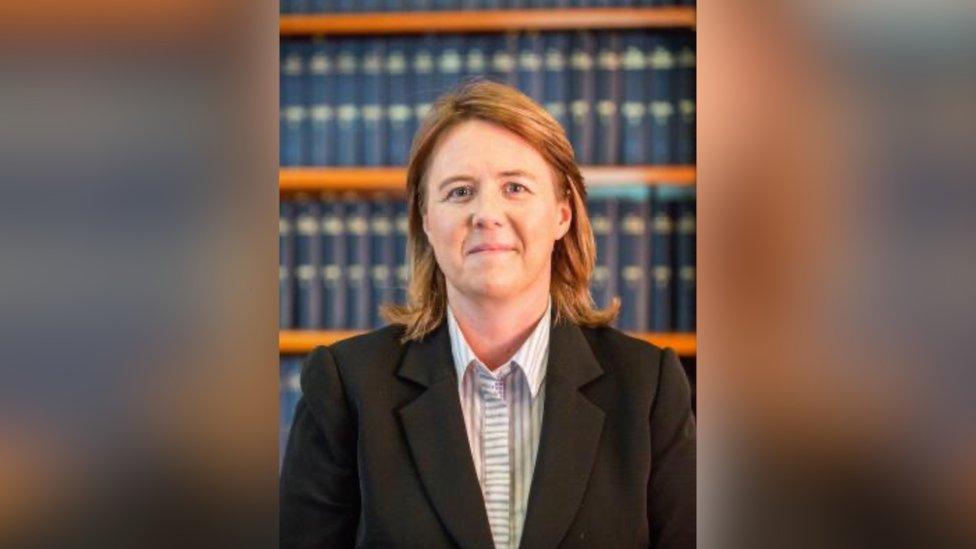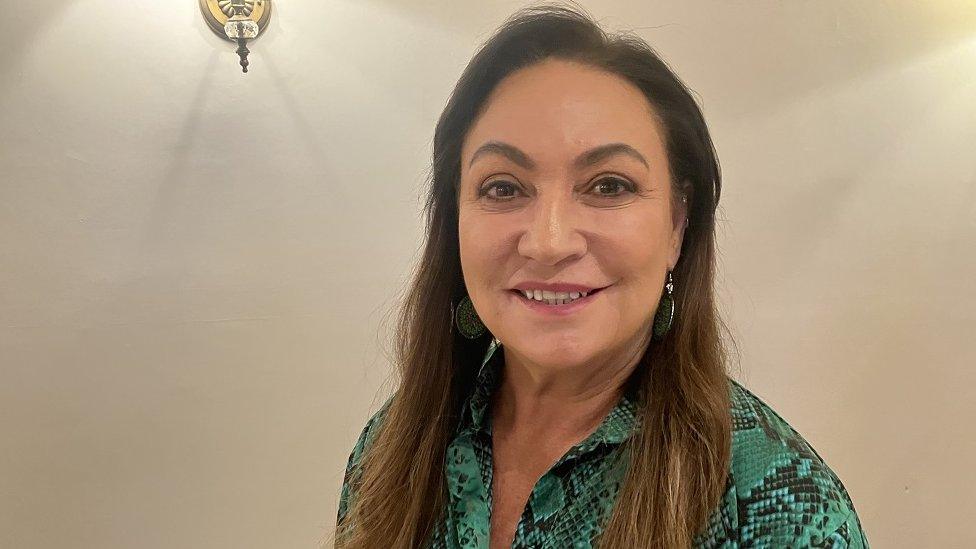Domestic abuse: Senior judge open to reform of family courts
- Published

Northern Ireland's most senior judge says she's open to the possibility of reform in family courts.
Dame Siobhan Keegan said she doesn't want "a mystique about family courts sitting in private" and "making decisions the public don't understand".
Her comments come as some victims of domestic abuse described their court experiences as intimidating.
One woman who spoke anonymously to BBC News NI said: "I don't trust the court system."
BBC News NI has spoken to three people about their experiences of the family courts.
Warning: Details of domestic abuse are contained below.

I was accused of fabrication - Janet
Janet, not her real name, says her claims of domestic abuse against the father of her child weren't taken seriously by the family court.
"There was emotional and verbal abuse in our relationship and there was the threat of physical abuse.
"After we separated he was intimidatory and I was red flagged as a serious case of domestic abuse and had a non-molestation order in place.
"One day a police officer turned up with a summons to a family court.
"When we got there the judge basically said the non-molestation order was gone, adding: 'We don't need it' and I was accused of fabrication.
"I was never asked about the abuse; it wasn't entertained as relevant."
Janet was keen to point out that she had never been involved with social services, adding that her older children have a "normal relationship with their father".
She now finds herself sending her distressed child to their father.
"To this day my child doesn't want to go to him, sometimes they come back with bruises. I don't have faith in any of it anymore.
"No one has ever been interested in my concerns about my child's safety. It feels like contact at all costs."

She chased me around the house with knives - Tommy
A male victim of domestic abuse, Tommy, also spoke to the BBC about his experience fighting for custody of his child.
"My ex lost someone and she started to go downhill, she began blaming me for everything; punching me in the face, biting me, standing over me with a knife while I slept, chasing me around the house with knives, threatening to kill me and herself.
"I got to the point I was afraid to come home, our little child was subjected to seeing all of this many times."
"I eventually got a non-molestation order and my ex had to leave the house while our child stayed with me."

"We ended up in family court and my ex now has more contact than me, at this minute our child is mainly with my ex, who is unstable."
"I felt like a fool. I felt judged and intimidated by the court."

What are family courts?
There are 12 family courts across Northern Ireland which make thousands of decisions every year.
The courts are closed to the media and the public, though England and Wales have recently piloted a reporting scheme.
Judges rule on issues such as adoption, divorce and child custody.
Dealing with private legal issues around custody and parental contact takes up a lot of court time.
In Northern Ireland in 2022, the family courts dealt with 4,489 of such cases out of a total of 13,823 cases that year.
These cases often involve allegations of domestic abuse, but the Department of Justice was unable to tell BBC News NI how many.
There has been criticism of family courts - and calls for greater transparency - for decades.
A 2020 government report, external on how family courts in England and Wales deal with domestic abuse found numerous problems and recommended cultural change and reform.

I knew my child wasn't safe - Jane
Jane, another woman who spoke to the BBC anonymously, said her ex-partner "was abusive through our marriage"
"After we separated, despite my attempts to keep things easier between us, he physically assaulted me in front our child. I knew I had to put something in place for my own safety."
Eventually things went to court: "I naively thought the family court would reduce some of the issues."
The court put in a place a contact order for the father to see the child: "When our child was with him I knew he wasn't safe, I knew he was often left alone and he came home upset."
"My ex has used this process. I do wonder where my rights are. I was identified as a high-risk domestic abuse case and it meant nothing.
"I don't trust the court system. For me the court is as much a perpetrator as he is."

What has been the reaction?
Joan Davies, chief executive of Family Mediation NI (FMNI), said the court system is "not fit for purpose for 21st Century family issues".
FMNI provides confidential family mediation throughout Northern Ireland.
Ms Davies said the organisation believes that poorly managed separations, domestic abuse and coercive control are currently at "epidemic proportions".
"We feel the courts alone are not equipped to deal with it," she added.
A key concern is that "all the different departments are working in silos".
Ms Davies said: "There needs to be not one change but all the departments working together because this is a societal issue, it's not a family justice issue only."

Dame Siobhan Keegan said reform of the system was on her agenda "to look at"
When asked about some of the experiences of domestic abuse survivors, Lady Chief Justice Dame Siobhan Keegan said she was committed to judge training in this area.
"I'm sorry to hear that people think, for instance, that non-molestations aren't taken seriously in courts because that wouldn't be my experience and it certainly wouldn't be my guide.
"Obviously not everyone has the same experience, and you're dealing with a few people that haven't had a good experience, and I'm sorry about that too," she said.
"I think the courts have become more adept at seeing the signs of coercive control or people trying to manipulate the court."
Dame Siobhan said reform of the system was on her agenda "to look at".
A statement from the Department of Justice said minister Naomi Long "is keen to look at how the transparency of family courts could be increased".
"However, the minister is also very mindful that family courts deal with the most sensitive and personal matters."
The statement added that there is "no consensus of opinion on this matter."
Due to the time remaining in the current mandate, "any potential legislative change would have to be progressed in the longer term".
If you have been affected by any of the issues in this story, help and support is available at BBC Action Line.
Related topics
- Published29 February 2024
